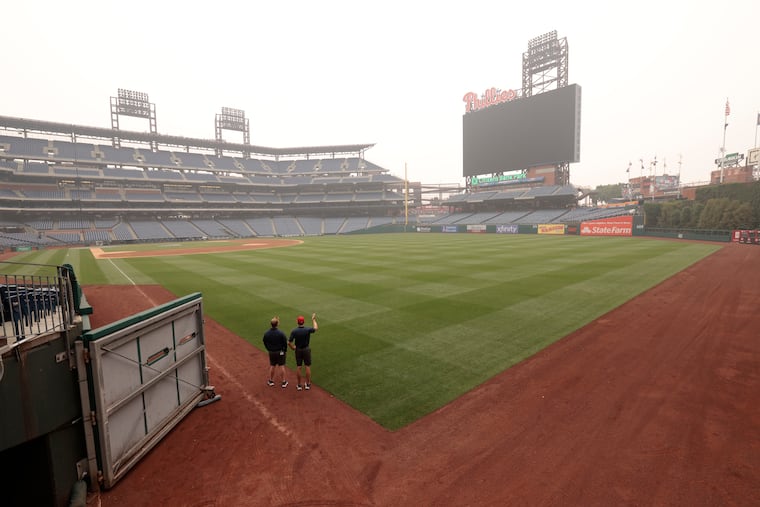Workers again ponder whether their jobs are essential, as poor air quality poses risk to outdoor employees
“We’re better prepared now for an uncommon occurrence such as this than we would have been before COVID-19," said Ryan Boyer, business manager of the Philadelphia Building Trades Council.

Effects of Canadian wildfire smoke blowing into the Philadelphia region raised familiar questions on Thursday about who is an essential worker. But this time, unlike early days of the COVID-19 pandemic, the greatest concern was for outdoor employees.
Philadelphia’s air quality remained in the “hazardous” category Thursday morning and was forecasted to dissipate before becoming more dense again Thursday evening. While the city’s air quality index had declined to the “very unhealthy” range for Center City by Thursday afternoon, it stayed in the hazardous range for parts of the region.
» READ MORE: Follow our live wildfire smoke coverage for the latest updates
That created questions about whether certain functions were crucial enough to risk putting the health of outdoor workers at risk.
Center City District’s on-street staff, who were deemed essential during the pandemic, remained on the job Thursday, but were allowed flexibility to take a personal day if they preferred not to work, spokesperson JoAnn Loviglio said. She added, “masks are always readily available for all CCD employees.”
Several construction jobs throughout the region have been shut down for the rest of the week, said Ryan Boyer, business manager of the Philadelphia Building and Construction Trades Council. The council has been evaluating the air quality in each location and seeking guidance from the Centers for Disease Control and Prevention and other health organizations, he said.
“The health and safety of our members come first and foremost,” Boyer said.
International Brotherhood of Electrical Workers Local 98 sent a message to members on Thursday, telling them that N95 masks are available for pickup at the union’s financial office or members can arrange to have them delivered to job sites.
Boyer said all unions in the Philadelphia Building Trades Council have made masks available to members that are KN95 or better, and respirators in some instances.
“We’ve developed a robust communication line so we can understand what’s the best practice and protocols to keep our members safe,” Boyer added. “We’re better prepared now for an uncommon occurrence such as this than we would have been before COVID-19.”
Sanitation workers in Philadelphia were pulled from their collection routes on Thursday because of the air quality concerns. Ernest Garrett, president of District Council 33, which represents 10,000 municipal employees including sanitation workers, applauded the decision.
“Safety is always the concern,” Garrett said. “This is something that’s unknown … so it’s better to stay on the safe side.”
Charles Carrington, president of the local that represents sanitation workers specifically, said many members have underlying health issues, including health effects that resulted from prior COVID-19 infections. They do want to get back to work as soon as it’s safe to do so, he added, so trash doesn’t pile up throughout the city, which may mean working on Saturday.
“We are essential personnel,” Carrington said.
Timothy Mulvenna, vice president of the National Association of Letter Carriers Keystone 157, said he and others from the union have been on the phone all day with the U.S. Postal Service regarding concerns about letter carriers’ safety working outdoors with the poor air quality. Mulvenna has told members that if they feel unsafe, they should raise that concern and ask for work indoors or suspension of mail delivery, he said.
“Employee safety remains a priority for the Postal Service. As such, we continue to monitor local conditions and communicate to our employees appropriate measures,” USPS spokesperson Paul Smith said.
The Philadelphia Zoo closed to the public on Thursday. Employees who are able to do their work from home were advised to stay home, and essential on-site staff are on a shortened schedule for the day to minimize outdoor time, spokesperson Maria Bryant said.
“For those working on-site, we are encouraging them to take extra precautions while working today,” Bryant added. “We have supplied them with N95 masks and have encouraged them to wear them while working outside. We’ve also advised them to take breaks indoors when needed.”
Some area restaurants have shut down outdoor dining, and even those with tables available outside have few people eating there. “We didn’t want to put the customers and staff in harm’s way,” said Stephen Starr, who stopped outdoor dining at 12 of his 40 restaurants in Philadelphia, New York, and Washington, D.C.
The Phillies postponed a game against the Detroit Tigers Wednesday night, which took place on Thursday. The Eagles moved their Thursday practice indoors.
Down the Shore, air quality was slightly better than in Philadelphia, but still in an unhealthy range. In Atlantic City, Fire Chief Scott Evans, who is head of emergency management, said all employees working outside, including the beach patrol, would be offered masks, or allowed to work inside, if they have respiratory issues.
Max Marin, Michael Klein, and Amy Rosenberg contributed to this article.